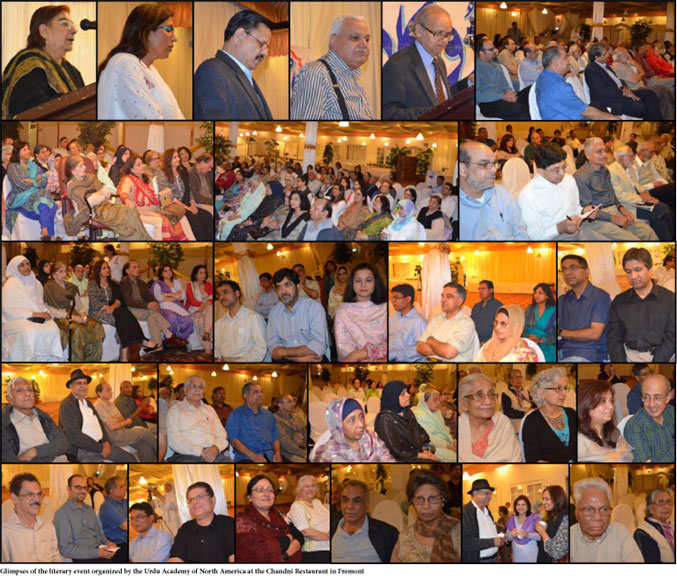Syed Ilyas Ahmed Thrills Bay Area
Crowd with Humor and Poetry
By Abdus Sattar Ghazali

Bill Cosby says, "You can turn painful situations around through laughter." To follow his advice, the Urdu Academy of North America dedicated its monthly literary evening to humor and laughter which are the most serious tools we have for dealing with impossible situations.
The literary event held on April 29, 2012, held at the ornate banquet hall of the Chandni Restaurant, Fremont/Newark, CA was chaired by Syed Ilyas Ahmed, a hospital management executive. And to the great delight of the audience, Syed Ilyas Ahmed turned out to be a great humorist who entertained the audience with his wits, jokes and poetical recitals that reflected the chaotic, tumultuous and turbulent situation of his homeland, Pakistan and particularly the city of Karachi where he now serves as Chief Adviser Operations at the Tabba Heart Institute.
Syed Ilyas Ahmed is not a poet but perhaps he has more insight than many poets into the trial and tribulations of life and finds humor the best weapon to help people smile at the situation that pains them.
He has inherited literary genes from his parents. His mother hailed from Lukhnow and father from Naitore (Bijnor) and educated at the Aligarh Muslim University. His younger sister, Humaira Rehman, is a well-known poetess with two published diwans. Humaira lives in New York and Urdu Academy has the honor to celebrate several evenings with her here in SF Bay Area.
For his many friends Ilyas Ahmed got a second life since he was once reported killed in an air ambulance crash while he was working at a military hospital in Libya. However, after many years his friends, particularly Tashie Zaheer, got the news that he survived the air crash and had returned to Pakistan where he was managing Shifa International Hospital, one of the leading hospitals of Islamabad.
It is said that there's no life without humor which can make the wonderful moments of life truly glorious, and it can make tragic moments bearable. Perhaps this is the reason that Syed Ilyas Ahmed, after surviving the great tragedy of the air crash, chose humor to enchant himself and fascinate others.
With his command on the Urdu language coupled with his God-gifted delivery style, Syed Ilyas Ahmed amused the audience for more than an hour. His humorous anecdotes and jokes also reflected the current situation in Pakistan.
On the sober side, Syed Ilyas Ahmed presented many popular poems of famous poets related to the current situation in Pakistan such as Suna hai janglouN kaabhee koii dastoor hota hai by Zehra Nigaah. He also presented:
Boorha panwari by Majid Amjad,
Yadish Bakhair by Prof.Jalilud Dola,
And Waqt by Javaid Akhtar
Mushtaq Ahmed Yousefi’s satires, Meri Beewee Ne Billi Palee and PIA's air hostesses and ground hostesses also drew wide applause.
He also presented the poetry of many popular poets including Josh Malihabadi, Amjad Islam Amjad, Gulzar, Hariwachan Rai Bachan and Prof. Andaleeb Shaadani.
At the end Syed Ilyas Ahmed entertained the audience with his presentation of humorous verses.
Seemab Akbarabadi
Syed Ilyas Ahmed's humorous presentation was the second part of the literary gathering of the Urdu Academy. The first part concentrated on the life and work of well-known Urdu poet Seemab Akbarabadi.
Dr. Tahir Mahmood presented a well-researched paper on the life and work of Seemab who was born in Agra in 1882.
As usual a number of Urdu enthusiasts presented Seemab's ghazals. They included: Hatim Rani, Javaid Umerani, Lubna Rehman, Mehmood Hassan, Meraj Sultana Ghazali, Misbah Rehman, Mukesh Kackar, Naseer Humayoun and Abdus Sattar Ghazali. Atia Hai and Talat Khan stole the show with their recital of Seemab's ghazals in their melodious voice.
Seemab was a disciple of Nawab Mirza Khan Daagh Dehelvi. H is forefathers had migrated from Bukhara during the reign of Mughal Emperor Jahangir and had settled in Agra.
Seemab wrote in all literary formats and on all social and political subjects; like Iqbal and Hali he was a crusader who spoke from the heart. In 1948, he went to Lahore and then to Karachi in search of a publisher for his monumental work, "Wahi -e - Manzoom ", an Urdu translation in verse form of the Holy Qur’an. He failed to find a publisher. Seemab did not return to Agra because in 1949 he suffered a massive paralytic stroke from which he could never recover and died on 31 January 1951. His translation of the Qur’an was published thirty years later.
The literary evening ended with a vote of thanks by Tashie Zaheer, President of the Urdu Academy of North America. He particularly thanked Syed Sarwat, proprietor of the Chandni Restaurant, for patronizing the Urdu language in the SF Bay Area.
-------------------------------------------------------------------------------------

